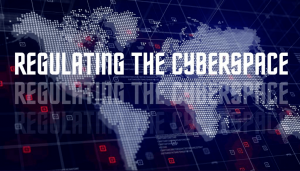Cyberspace encompasses all types of hardware, software/applications, algorithms and protocols of technology interactions as well as human communications with and within them. The connections between all these different entities form an interesting structure and pattern of. Regulation of the cyberspace has to do with setting up certain rules and regulations to serve as a guidance on the dos and don’ts expected within this system. A lot of crimes are committed on the internet, for example, trafficking of persons, child pornography, kidnapping for ransom, and terrorism are perpetrated with the use of the constituents of the cyberspace hence, the need for regulation.
Why should the cyberspace be regulated.
The cyberspace as we know it has no formal framework. There are no definite bounds except the capacity of the hardware used for access. The lack of an all-encompassing formal structure or plan makes cyberspace nobody’s province. No single person, organization or government owns or controls it. In property law, cyberspace may be considered a space for all; it is incapable of private concession.
The default system in the cyberspace is anonymity or secrecy. Anonymity encourages and enhances the exercise of freedom. A child too shy to express himself in the physical space can act or decides to be somebody else in virtual space and express himself freely, by so doing, facilitating information sharing and social interactions.
The ease of communication within the cyberspace greatly enhances global trade. Goods are traded over cyberspace instead or position of the traditional person-to-person mode. Huge financial transactions are achieved through computers and even mobile phones. Paperless transaction has become common. Even court filings are shifted to electronic means.
On the negative end, the internet has become a medium for character assassination and a provider of deceptive and fake news, where an individual or organization can be painted in an unflattering light. This usually results to a complete defamation of said entity without having no legitimate backing of truth. Crimes of global repercussion are also committed within the internet. Trafficking of persons, child pornography, kidnapping for ransom, and terrorism are perpetrated with the use of cyberspace. Thus, freedom in cyberspace should not be exercised without the concomitant responsibility of its users. The extent to which lack of accountability has been normalized in the cyberspace is alarming.

How can the cyberspace be regulated.
In “A Non delegation doctrine for the digital age” (Cited: 50 Duke L.J. 5), James Boyle argued that regulation of the internet can increasingly rely on a three-fold strategy:
- Privatization: The state can use a private body to achieve those goals which it could not get directly and then implement that body’s decision through mandatory technological arrangements. For e.g. for Copyright enforcement in Cyberspace, the Clinton administrations original plan was to make Internet Service Providers (ISPs) strictly liable for copyright violations by their subscribers – thus creating a private police force, largely free of statutory and constitutional privacy constraints with strong incentives to come up with innovative surveillance and technical enforcement measures.
- Properitization: According to him, an attempt is to be made to extend and then protect intellectual property rights online. This will produce many technical methods of enforcement.
- Technological Controls: this system ensures that hardware i2 designed for desired regulatory features. For example, Digital texts and music could be encoded to a particular person. Detection devices could be built in to players, so that others cannot play one’s music. Unique identifiers could be built into computer chips, so that a person’s computer would broadcast a universal ID with an associated set of legal characteristics as you roam the net.
The onus lies on the government of each state to regulate the use of the cyberspace in their various constituencies. Due to this, there have been inconsistencies in the regulatory laws that govern the cyberspace. What is unacceptable in country A can be totally allowed in country B.
While some measures have been put in place to ensure fairness, protection of intellectual property, acceptable use of socio-economic platforms and the right to privacy, the negative impact of the culture of anonymity in the cyberspace that is allowed for individuals greatly persists.
CONCLUSION
The Cyberspace avails us ease in sharing information, allows smooth social and business interactions, allows exchange of ideas all in a press of a few buttons, and create intuitive media among many other activities. This is why it is pertinent to have a general binding understanding of an acceptable use of the cyberspace.
Although similarities exist in the measures that have been put in place by country laws to regulate the cyberspace, there is no one law that regulates its use. Some countries have approached regulations in a lackadaisical manner, the light-handed attitude of the enforcers has made users perpetuating moral and criminal offences view the regulations in disregard.
The way forward would be to organize an international body of enforcers, where the culture of each country will be taken into consideration to generate an all-encompassing binding rule or framework on the best way to free the cyberspace from trolls and criminals. This should be a continuous effort from all parties where the laws will be reviewed on a timely basis and punishment for defaulters will be greatly adhered to. When this is put in place, the likelihood of a safer and more enjoyable usage of the cyberspace will see a shift in a positive direction.


Recent Comments